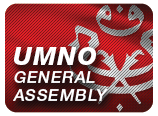Can Umno rejuvenate trust in the party?
Umno wants to be a youthful party, a party that is more in touch with the younger generation who will be key voters in the next general election.

But even as Umno tries to rejuvenate or “remajakan” itself, there is still the question of whether its young leaders have the ideas and policies that can win over a more critical and sceptical electorate.
This is since for the first time in years, Umno’s policies and its governments are compared with rival administrations run by PAS, PKR and the DAP.
Umno believes that by borrowing from the practice of these parties who are more open to elevating younger leaders, it can repeat the success their rivals had in the last two general elections.
It is learnt that the party’s senior leadership believes so strongly in this push for rejuvenation that they are willing to fight its own “warlords”.
These are the middle-ranking older leaders who control the party’s grassroots in its 191 divisions and who shape public opinion at the communal level.
During an election, division leaders control the party’s machinery and it has become standard practice to pick the party’s candidates from among them.
This culture has been so entrenched that younger leaders have been stopped from going up and being chosen as election candidates even if they are more talented and qualified.
It’s a culture that has been criticised by the likes of former president Tun Dr Mahathir Mohamad and most recently, party number two Tan Sri Muhyiddin Yassin.
Muhyiddin in fact, spent one-third of his speech on Tuesday night, during the opening of the Wanita, Puteri and Umno Youth assemblies, to talk about rejuvenation and how it was going to save Umno.
He also castigated the warlords for holding the party back and wants those who have overstayed their posts to make way for better leaders.
But rejuvenation goes beyond just replacing deadwood at the grassroots levels.
Umno Youth deputy chief Khairul Azwan Harun believes that for Umno to really have a chance in the next few years, the cabinet itself has to have a better combination of young professionals and seasoned veterans.
“The average age in the cabinet now is 58. But if you are a 20 or 30 something, it is difficult to believe that someone 58 will know your problems.”
Umno Youth, especially under Khairy Jamaluddin, has been trying to be a voice and solution to those problems.
Khairy has advocated for more schemes to help young salary earners to own houses, amend bankruptcy laws and most recently, to help them for their first vehicle.
About half of his speech while opening the Umno Youth assembly contained these policy prescriptions.
All these could resonate with young voters. According to independent pollster Merdeka Center, the primary worries of younger voters are bread-and-butter issues such as jobs, incomes, housing and cost of living.
Yet what is also important is whether the public trusts that Umno is better than Pakatan Rakyat at carrying out policies that will improve their lives.
Umno Youth’s policy prescriptions have to be looked at in relation to how Umno and Barisan Nasional manages the country.
For instance, while Umno Youth brings up the problem of housing being expensive, not one delegate at its assembly yesterday debated whether or not to postpone the Goods and Services Tax (GST).
Nor did its delegates raise questions about worries that sovereign wealth fund 1Malaysia Development Berhad could bankrupt the economy.
Or that corruption and leakages in government spending continue to be a drain on public funds.
Or why is it that Umno was not championing free tertiary education, which Pakatan Rakyat claims it is able to do if it takes over federal power.
It would also almost seem contradictory that while Umno Youth wants to go out and win over young, urban, educated voters, it still feels that the Sedition Act should be maintained.
This is since the freedom to question government policy, said analyst Wan Saiful Wan Jan, was an important issue to this group of voters.
“Urban voters want liberty so it is contradictory to call for retaining the Sedition Act while wanting to get the urban vote,” said Wan Saiful of the think tank Institute of Democracy and Economic Affairs.
As it stands, about 43% of Malaysians polled by Merdeka Center in October 2014 are dissatisfied with how Umno, together with Barisan Nasional, is governing the country.
About 38% are satisfied with the government.
So even if Khairy’s party elders allow more younger leaders into the halls of policy-making, they still face the uphill task of convincing the public that their ideas are better than their seniors and that of their rivals in the PR. – November 27, 2014.


